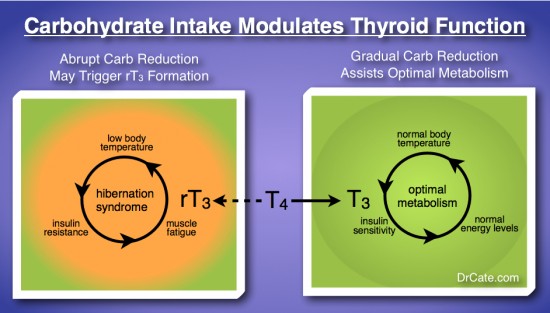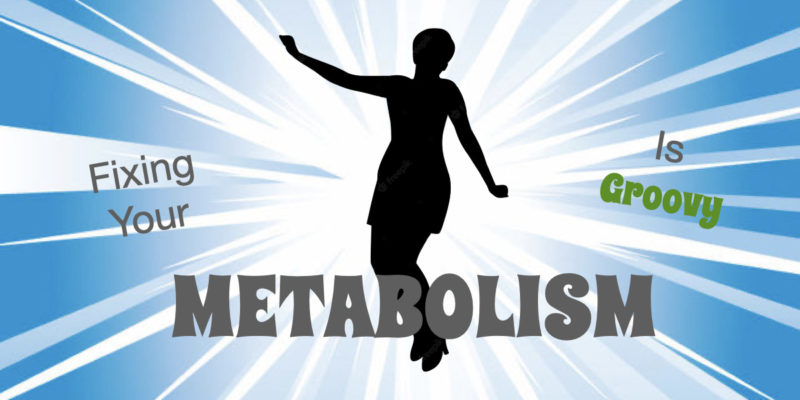If dairying began in the Paleolithic era, as I believe it did, then our genes have been depending on these nutrients for thousands of generations. Learn how your skeletal development can be sculpted by dairy products.

Going Low-Carb too Fast May Trigger Thyroid Troubles and Hormone Imbalance
Table of Contents

If you’ve been turned on to the low-carb Paleo diet craze, you may have noticed increased energy, better digestion, happier mood, and a shrinking waistline. Good for you. But some folks who’ve taken the Primal leap—particularly those who were previously on a high-carb diet—have been faced with unexpected side effects waving them back to the world of bread, sugary fruits and sweet potato casserole.
Interestingly, these side effects include a wide range of symptoms that are nearly identical to symptoms of severe thyroid hormone deficiency. More interestingly, lab tests often show normal or near-normal thyroid function. More interesting still is that these symptoms seem to only be relieved by adding back carbs into the diet, sometimes upward of 300 grams—a level I consider to be very likely to harm.
Why is this happening? Is it that low-carb simply doesn’t work for everyone, or is something else going on?
This article is continued below...(scroll down)
The low-carb conundrum just so happens to be an issue I’ve been pondering since reading about the controversy over safe starches. Recently, a couple of pieces of the puzzle fell into place that I think add up to at least one explanation for the debilitating symptoms and offer a method for anyone going low-carb to do so without problems.
Here’s what I discovered about those with thyroid problems.
Abrupt Change May Be too Much For the Thyroid
People who run into trouble going low-carb seem to follow a pattern. They follow any number of diets from SAD to vegan before making a relatively abrupt switch to a low-carb (often less than 50 gm) diet. At first they lose weight as hoped, but then, instead of feeling more energetic from their weight loss, they develop fatigue, sometimes accompanied by symptoms of low thyroid function, including cold extremities, hair loss, and digestive problems. Only by consuming more carbs again can they reduce these symptoms.
Because their fatigue and other symptoms are classic for thyroid malfunction, many will get their levels tested, only to come away confused when the tests health practitioners typically order (TSH and T4) come out normal.
Those who get more extensive testing may get a test called reverse T3, or rT3 for short. These are often abnormally high, leaving them to believe they have found the root of the problem. Some are given a prescription for T3 in hopes of regaining energy, and the intervention seems to help, at least a little.
Reverse T3 is a kind of chemical opposite of regular T3, a mirror image compound called an enantiomer. Reverse T3 has opposite effects of T3 and has long been associated with a set of symptoms aptly called hibernation syndrome—fatigue, weight gain, and so on. If you have suffered from severe hypothyroidism, you may have gone through times when you felt like you really just want to crawl away to a quiet place and rest for a long, long while. Your body was telling you to hibernate.

In addition to making our energy go dormant, high rT3 is also associated with increased levels of LDL, often in the 200s.
Interestingly, those who have added carbs back into their diet and have gotten retested find that their levels of rT3 have gone down without additional T3 supplementation. What’s more, if their LDL was high, adding carbs back to the diet also solved that problem as well, completely counter to the idea that carbs drive insulin which increases LDL.
I have to admit that though I have cared for thousands of people following low-carb diets, to my knowledge, none ran into this problem, so I paid very little attention to the issue with rT3. Only when I started reading about people suffering from thyroid side effects from following low carb did I started seriously thinking about that pesky little molecule. I wondered what it was supposed to be good for: Why would nature program our biology to manufacture a compound that seems to do little other than make people miserable and potentially clog our arteries?
The reason low carbing triggers thyroid changes
In doing research on rT3, I ran into a fascinating article on a group of little-understood compounds called thyronamines (pronounced thigh-row-na-meens). The key to understanding rT3, and unlocking the relationship between carbohydrate consumption and thyroid function, may lie in these newly discovered compounds.
Thyronamines have powerful effects on energy metabolism
Studies performed in 2010 showed that injecting thryronamines into the belly cavity or brain tissues of experimental animals cause the following physiologic and behavioral changes:
- Impaired ability to utilize sugar as an energy source
- Insulin resistance
- Lowered basal body temperature
- Weaker than normal heart contractions
- A marked decline in activity (We can’t ask the lab animals, but presumably, this would be induced by what we would describe as feelings of extreme fatigue)
Sound familiar?
Upon injection, the effects begin within minutes and last 8-12 hours.
And here’s the punchline: Thyronamines appear to be manufactured from that go-to-sleep hormone reverse T3. We can’t yet test you for high levels of thyronamines, but in testing your rT3, we are testing for the precursor of thyronamines. And I expect that, when studies are done in people, we will discover that high blood levels of rT3 do indeed correlate with high tissue levels of thyronamines.
I think this research is vitally important and that we will be hearing more about thyronamines in the future. But we are still left with a very important question that remains unanswered: What do we do about it?
For an answer, we can look to nature and find what I call The bear in the woods theory.
Changing from carb-burn to fat-burn demands new metabolic machinery
The bear in the woods theory suggests that it is the relatively sudden change from high carb to low that flips the switch.
Bears are omnivores, just like humans. And, of course, bears hibernate. Understanding the variations of a bear’s diet throughout the year helps us to understand why biology has built into our mammalian metabolism a sensitivity to changes in carbohydrate consumption.
Imagine you are a bear living in Yellowstone national park. It’s late summer, and the salmon runs are gone, the grazing animals born in spring have now grown too fast for you to catch, the grubs under the rocks are all hatched, and pretty much all that’s left, aside from campground garbage, is nuts and berries. Plucking ripe berries off a bounteous shrub is far easier than cracking nuts, so you gorge on berries. In a few weeks, though, the berries are gone, and there’s very little food left. That’s okay, because the abrupt decline in carbohydrate consumption is accompanied by increased reverse T3 and increased production of thyronamines, which makes you feel exhausted. Thanks to all the weight you gained, you are now so well-padded with cushy fat that you think you could just crawl into a cave somewhere and sleep for a long, long time.
Research in humans shows that, just like bears, our thyroid hormones are influenced by major changes in the amount of carbohydrates consumed.
For some, an abrupt decline in available glucose may trigger an atavistic hibernation reflex, which will trigger the conversion of a thyroid hormone called T4 into something other than the normal T3, namely into the reverse form, rT3. rT3 then gets converted into thyronamines and causes all the symptoms of low thyroid function without significant deficiencies of thyroid hormone showing up on lab tests, leaving people to worry there is something incredibly wrong with their hormonal function.
How do you enter fat-burning mode without going into hibernation? The solution is gradual change.
If you have gone low carb successfully, you have accomplished a major change in your metabolism, one that involves turning on scores of enzymes your body has not needed or used for a long time, decades in some cases. Not everyone can accomplish this overhaul in time. Those who can often continue low carb for life with great success. But those who cannot accomplish all the necessary changes flip the hibernation switch, and increase production of rT3 and thyronamines, which causes crushing fatigue and may lead to intense carb cravings in order to turn off the hibernation switch again.
For these people, an easy way to avoid flipping the hibernation switch and reduce carb cravings may be to simply make a more gradual reduction in carbs rather than an abrupt one.
Atkins, who advocates an abrupt switch to less than 20 gm per day, seems to have been aware of this problem, and in fact, in his writing, he warns people they may experience fatigue in the first few days or weeks after going very low carb. Unfortunately, for some people, the fatigue never improves, and they give up on low-carbing altogether.
Instead of giving up, I believe you can try again but next time don’t go cold turkey on carbs. Cut back gradually.
Incidentally, none of my patients reported feeling worse when they went low carb. I suspected it had something to do with the fact that I introduced them to low carbing one meal at a time beginning with breakfast. I made this recommendation simply because I didn’t have time to go over everything with them in one visit. I only had time to give them ideas for one meal, and had them start by cutting carbs from breakfast because that is the time of day we are most able to switch our dormant fat-burn enzymes from off to on.
Bottom line: If you jump into the Paleo (or any low-carb) program and hit a brick wall because of side effects, instead of giving up on low-carbing for good, add back your carbs until you feel better again and then try cutting down again, but go slow to give your body the time to adapt to the idea. This way, your low metabolism can gear up to give you the fat-burning benefits of hibernation without having to take the four-month winter snooze.

Please note: Please do not share personal medical information in a comment on our posts. It will be deleted due to HIPAA regulations.
This Post Has 201 Comments
Comments are closed.
Note: Please do not share personal information with a medical question in our comment section. Comments containing this content will be deleted due to HIPAA regulations.



















[…] Going Low-Carb too Fast May Trigger Thyroid Troubles and … – Home; Going Low-Carb too Fast May Trigger Thyroid Troubles and Hormone Imbalance […]
[…] Going Low-Carb too Fast May Trigger Thyroid Troubles and … – Hi, I was doing a cyclic ultra low carb diet that (I think) caused my LDL to go up rapidly. After doing a Thyroid test, it was on the low side. […]
[…] Going Low-Carb too Fast May Trigger Thyroid Troubles and … – Hi, I was doing a cyclic ultra low carb diet that (I think) caused my LDL to go up rapidly. After doing a Thyroid test, it was on the low side. […]
[…] Going Low-Carb too Fast May Trigger Thyroid Troubles and … – Hi, I was doing a cyclic ultra low carb diet that (I think) caused my LDL to go up rapidly. After doing a Thyroid test, it was on the low side. […]
[…] Going Low-Carb too Fast May Trigger Thyroid Troubles and … – Hi, I was doing a cyclic ultra low carb diet that (I think) caused my LDL to go up rapidly. After doing a Thyroid test, it was on the low side. […]
[…] Low carb has been all the rage for quite some time. We stumbled onto the whole thing about 3 or 4 years ago when my hubby had some serious health issues. Initially the greatest warning I could find were about ketosis. As time passed I started struggling with some imbalances and I started really digging into it. Turns out, low carb too quickly, too much is really really really dangerous. Ketosis is the least of your problems so take it very slowly. In this article Dr Cate touches on thyroid problems that could be triggered by going low carb too quickly. But go read for yourself. Dr Cate on low carb and the thyroid […]
[…] Going Low-Carb too Fast May Trigger Thyroid Troubles and Hormone Imbalance […]
You specifically mention folks who develop rT3 but have no other blood lab signs of hypothyroidism. What about someone who has hypothyroidism PRIOR to going low carb, then 18 months in, his/her rT3 to free T3 ratio is terrible? I believe all of this was tested prior to 2009 (the rT3 ratios before), but I’m not certain, as I don’t have ready access to those records. That being said, I do have evidence showing TSH issues (and negative antibodies tests – both types) and treatment with T4 medication before I pushed for rT3 testing this time, and got numbers showing that I needed treatment there, too.
I’m an all or nothing person – and always have been. I can’t (easily or successfully, so far) do moderate carbs without flaring up my insulin resistance to the point I faceplant into ALLTHECARBS… It’s frustrating. I started low carb at the behest of my endocrinologist on 1/15/15, aiming for 50 grams of carbs. I was close for that first month, then realized I was closer to keto levels, so I took that leap on 2/18/15. I lost weight steadily until the end of March/beginning of April, and then I started gaining. I’ve managed some of that gain again, but have yet to find my footing solidly again as far as losses. I did take some time off my low carb plan around the holidays (about a total of 30+ days, but not all in a row). Other than random 100 grams of carb days, I’ve been back low carb since 1/25/16, but I’ve not lost more than 5 pounds in that time, though I have gotten back down my previous size jeans I was in prior to going off plan.
I’m just curious specifically how the rT3 issue can be present with and without underlying other thyroid issues – and whether it’s still related to this issue…of needing to up carbs, etc.
[…] Going Low-Carb too Fast May Trigger Thyroid Troubles … – At first they lose weight as hoped but then, … which will trigger the conversion of a thyroid hormone called T4 into something … If you have gone low carb … […]
[…] https://drcate.com/going-low-carb-too-fast-may-trigger-thyroid-troubles-and-hormone-imbalance/ […]
[…] References: – Vreugdenhil, A. C. E., Snoek, A. M. P., van ‘t Veer, C., Greve, J.-W. M., & Buurman, W. A. (2001). LPS-binding protein circulates in association with apoB-containing lipoproteins and enhances endotoxin-LDL/VLDL interaction.Journal of Clinical Investigation, 107(2), 225–234 – Horton, J. D., Cuthbert, J. A., & Spady, D. K. (1993). Dietary fatty acids regulate hepatic low density lipoprotein (LDL) transport by altering LDL receptor protein and mRNA levels. Journal of Clinical Investigation, 92(2), 743–749 – Tosco A et al. Molecular bases of copper and iron deficiency-associated dyslipidemia: a microarray analysis of the rat intestinal transcriptome. Genes Nutr. 2010 Mar;5(1):1-8. http://pmid.us/19821111 – Harvey LJ, McArdle HJ. Biomarkers of copper status: a brief update. Br J Nutr. 2008 Jun;99 Suppl 3:S10-3. http://pmid.us/18598583 – Juan J. Díez, Pedro Iglesias. (2014) Serum cholesterol and triglyceride levels in diabetic patients with subclinical hypothyroidism. Endocrinología y Nutrición (English Edition) 61, 419-425 – N. Silva, O. Santos, F. Morais, I. Gottlieb, M. Hadlich, T. Rothstein, M. Tauil, N. Veras, M. Vaisman, P. d. F. Teixeira. (2014) Subclinical hypothyroidism represents an additional risk factor for coronary artery calcification, especially in subjects with intermediate and high cardiovascular risk scores. European Journal of Endocrinology 171, 327-33 – https://drcate.com/going-low-carb-too-fast-may-trigger-thyroid-troubles-and-hormone-imbalance/ […]
[…] Dr. Cate Shanahan – I’ve referred to this same post a while ago, but I’ll link it again here. She’s part of Mark Sisson’s Primal Advantage program. In this post she describes reading about people that have gone low carb and developed elevated rT3, and thinks this is mainly due to going low carb too abruptly. She says that she’s been able to avoid this problem in her patients by transitioning them to low carb gradually over time. […]
[…] read about a number of hormonal issues taking place in folks that go too low carb, and continue to work out intensely (and even those who […]
Hi,
I was doing a cyclic ultra low carb diet that (I think) caused my LDL to go up rapidly. After doing a Thyroid test, it was on the low side. I’ve added back carbs and will retest LDL soon but I really preferred the effect of low carb (leaning out) what do you think is to low? is 50 grams a day too low or would that be gradual enough to prevent LDL issues? All my other numbers are great CRP, LDL is big and fluffy, particle count low, just not clearing from the blood.
Thanks,
Ben
Paleo is not lowcarb, that is a misconception. Paleo is carb neutral. It means whatever carb level that suits you. Going grain free doesn´t mean going lowcarb necessarily, it just means getting rid of this type of carbs that can trigger inflammation, leaky gut etc. Some prefer a lowcarb Paleo diet, some say that high or medium carb paleo is the best but it is very individual. There are healthy carbs in many other vegetables.
You may want to read some of Paul Jaminet’s work. I too felt like crap on a very low carb diet but after following Paul’s advice I’m finally regaining my health. Good luck.